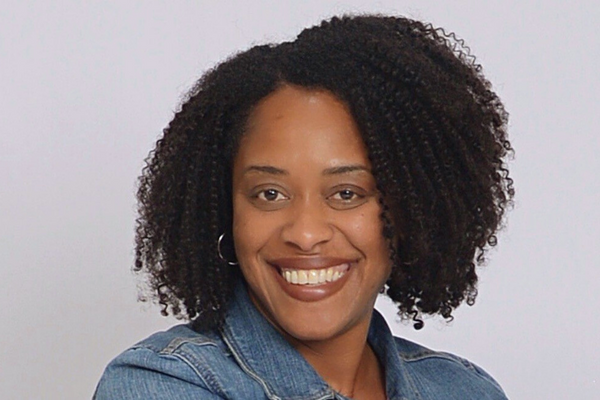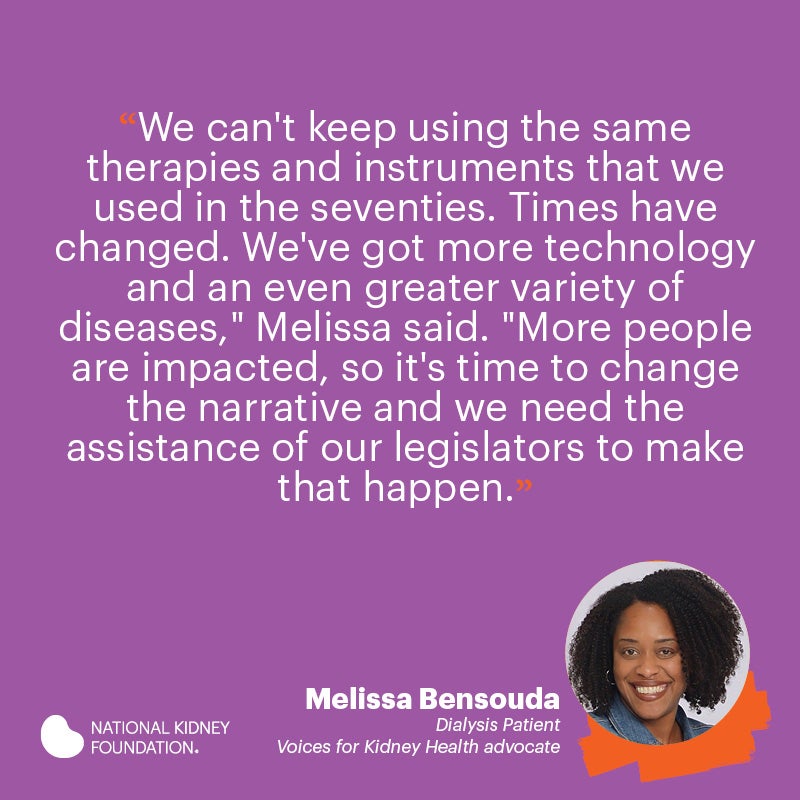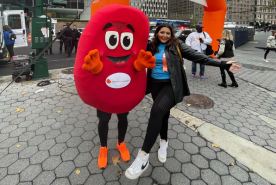February 16, 2023
First diagnosed with kidney disease in 1999 at twenty-seven, Melissa Bensouda knows better than most that living with kidney disease is a life-long journey. She spent three years trying to maintain kidney function before experiencing kidney failure, lived with a kidney transplant for five years, and spent more than ten years on in-center and home hemodialysis. Now she is using her knowledge to help everyone who has and is at risk of kidney disease as a Voices for Kidney Health advocate.
Getting diagnosed with kidney disease
Melissa's diagnosis was a shock since no one in her family had ever been diagnosed with kidney disease. Needing support, Melissa sought a network of people with similar experiences.
"When I was first diagnosed, I didn't have a sense of what it fully meant. I got involved in advocacy, more as an educational opportunity for me and my family," said Melissa. "I would participate in Kidney Walks and speak with other patients at my dialysis center. As I got more involved, I realized there was a need to do many more things."
One of those things was educating her family about kidney function and kidney disease.
"I always ask about the last time people had blood work done and had their kidneys checked. I'm at family gatherings asking when you last had your eGFR checked," Melissa said. "My family knows what creatinine is. I'm asking about their blood pressure and sometimes we take blood pressure at family gatherings. It takes a village to make sure people understand what kidney disease means. You can never have too many conversations about it and why kidneys matter."
Wanting to further her impact, Melissa took her advocacy to the next level by serving as a chair member for the Kidney Walk and other kidney-based community events.
Join the NKF Blog Newsletter
Get inspirational stories and kidney disease resources delivered to your inbox every month. You'll gain practical insights and expert advice to help you better understand and manage your kidney health no matter where you are on your kidney journey. Subscribe today.
Educating and inspiring legislators
Melissa enjoyed working on these local events so much that she decided to try her hand at national advocacy.
"My advocacy focuses on legislation and making sure that our congressional leaders are aware of the pressing needs that kidney patients and their families face," said Melissa. "I talk about the basics of kidney disease, what dialysis is, and what a transplant means. A lot of this is preventable. Some things can be done in education, starting at a very young age, about healthy food choices and exercising."
When she's not educating legislators or lobbying for new laws that benefit kidney patients, she's pushing for advancements in diagnosis and treatment.
"We can't keep using the same therapies and instruments that we used in the seventies. Times have changed. We've got more technology and an even greater variety of diseases," Melissa said. "More people are impacted, so it's time to change the narrative and we need the assistance of our legislators to make that happen."
While effecting change at the national level can be difficult, Melissa remains steadfast in her efforts to help those living with kidney disease. She believes everyone deserves access to better diagnoses, new treatments, and home hemodialysis.
"Some areas and clinicians are very aware of home dialysis, different therapy options, and new technologies but there are many areas of the country not tuned into those things. Patients are not hearing about transplant options or how to maintain the best quality of life," Melissa said. "That's the work that needs our undivided attention."
See all the ways you can take action as a Voices for Kidney Health advocate.
Sharing the joys of advocating
Melissa finds purpose in sharing her story and seeing how kidney policy has changed.
"We have achieved wins that I did not expect to see in my lifetime, like the new Medicare benefit that covers immunosuppressive drugs indefinitely," said Melissa. "When I'm able to speak with health care clinicians and share my story, that's a win for me. I'm a huge proponent of home dialysis and I have spoken to many patients who've considered it. Not all have switched over, but some have and I consider that a huge win."
Most importantly, Melissa wants people to understand that living with kidney disease does not mean the end.
"When I was first diagnosed, I thought I had five years to live. Twenty years later, I feel like I'm thriving. It's not easy. I get tired often and have to hook up to a machine every other night, but I still find joy in life," Melissa said. "I've gotten so much better doing dialysis. It allows me to work full-time and spend time with my children. That's what's important."
Join our network of advocates to make a difference for the kidney community and get connected with other amazing advocates like Melissa. We can't wait to meet you.


















